 (source)
(source)
|
Clarence Edward Dutton
(15 May 1841 - 4 Jan 1912)
American geologist who was the first head of the USGS division of volcanic geology (1887). He coined the term isostasy for his explanation that continents rise higher on the Earth's surface by virtue of their less dense crustal rock
|
Science Quotes by Clarence Edward Dutton (7 quotes)
Each volcano is an independent machine—nay, each vent and monticule is for the time being engaged in its own peculiar business, cooking as it were its special dish, which in due time is to be separately served. We have instances of vents within hailing distance of each other pouring out totally different kinds of lava, neither sympathizing with the other in any discernible manner nor influencing other in any appreciable degree.
— Clarence Edward Dutton
In Report on the Geology of the High Plateaus of Utah (1880), 115.
Germs of a theory, though in their present condition they are vague and formless … may be said to resemble stones in the quarry, rough and unhewn, but which may some time become corner-stones, columns, and entablatures in the future edifice.
— Clarence Edward Dutton
In Report on the Geology of the High Plateaus of Utah (1880), 114.
Great innovations, whether in art or literature, in science or in nature, seldom take the world by storm. They must be understood before they can be estimated, and must be cultivated before they can be understood.
— Clarence Edward Dutton
In Tertiary History of the Grand Cañon District: With Atlas (1882), 142.
The Grand Cañon of the Colorado is a great innovation in modern ideas of scenery, and in our conceptions of the grandeur, beauty, and power of nature. As with all great innovations it is not to be comprehended in a day or a week, nor even in a month. It must be dwelt upon and studied, and the study must comprise the slow acquisition of the meaning and spirit of that marvelous scenery which characterizes the Plateau Country, and of which the great chasm is the superlative manifestation.
— Clarence Edward Dutton
In Tertiary History of the Grand Cañon District: With Atlas (1882), Vol. 2, 141.
The origin of volcanic energy is one of the blankest mysteries of science, and it is strange indeed, that a class of phenomena so long familiar to the human race and so zealously studied through all the ages should be so utterly without explanation. (1880)
— Clarence Edward Dutton
In Report on the Geology of the High Plateaus of Utah (1880), 113.
Those who have long and carefully studied the Grand Cañon of the Colorado do not hesitate for a moment to pronounce it by far the most sublime of all earthly spectacles. If its sublimity consisted only in its dimensions, it could be sufficiently set forth in a single sentence. It is more than 200 miles long, from 5 to 12 miles wide, and from 5,000 to 6,000 feet deep. There are in the world valleys which are longer and a few which are deeper. There are valleys flanked by summits loftier than the palisades of the Kaibab. Still the Grand Cañon is the sublimest thing on earth. It is so not alone by virtue of its magnitudes, but by virtue of the whole—its ensemble.
— Clarence Edward Dutton
In Tertiary History of the Grand Cañon District: With Atlas (1882), Vol. 2, 142-143.
Volcanic eruptions are very local phenomena. At any given epoch they are confined to a few localities of very small relative extent.
— Clarence Edward Dutton
In Report on the Geology of the High Plateaus of Utah (1880), 115.
See also:
- 15 May - short biography, births, deaths and events on date of Dutton's birth.
- Tertiary History of the Grand Canyon District, by Clarence Edward Dutton. - book suggestion.
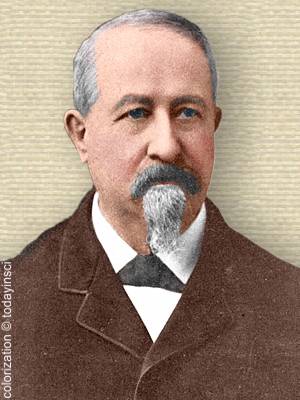
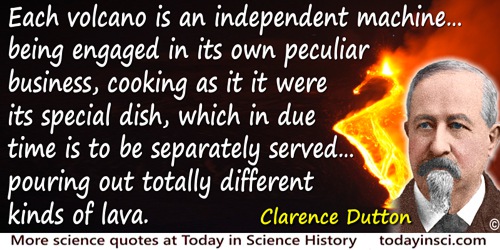
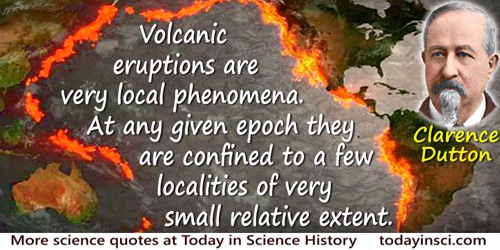
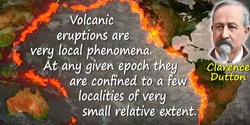
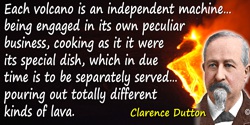
 In science it often happens that scientists say, 'You know that's a really good argument; my position is mistaken,' and then they would actually change their minds and you never hear that old view from them again. They really do it. It doesn't happen as often as it should, because scientists are human and change is sometimes painful. But it happens every day. I cannot recall the last time something like that happened in politics or religion.
(1987) --
In science it often happens that scientists say, 'You know that's a really good argument; my position is mistaken,' and then they would actually change their minds and you never hear that old view from them again. They really do it. It doesn't happen as often as it should, because scientists are human and change is sometimes painful. But it happens every day. I cannot recall the last time something like that happened in politics or religion.
(1987) -- 


